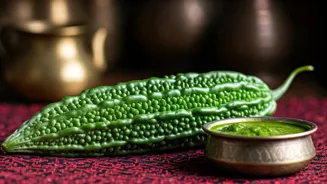Karela's Nutritional Power
Karela is loaded with vitamins and minerals, making it a superfood. It helps manage blood sugar levels, benefiting those with diabetes. The vegetable is also
known for its antioxidant properties. It's a common sight in Indian homes, often cooked in various regional styles, showcasing its versatility.
Bitter Taste Challenges
The distinctive bitterness of karela is due to compounds called cucurbitacins. This can be off-putting for some, but several methods can reduce the bitterness. Soaking the vegetable in salt water is a classic approach in Indian kitchens. Other techniques involve pre-cooking or pairing it with ingredients that balance the flavor.
7 Karela Culinary Tricks
From simple methods to complex recipes, there are many ways to enjoy karela. Try stir-frying it with onions and spices, or stuffing it with a tangy masala. Adding tamarind or jaggery can balance the bitterness. Consider combining it with potatoes or cooking it in a yogurt-based curry for a tasty experience.
Karela and Indian Cuisine
Karela is a versatile vegetable, popular throughout India, with dishes varying across regions. In the South, it might be part of a sambhar, and in the North, it could be a spicy sabzi. The use of regional spices and cooking methods significantly influences the final flavor, making karela preparations diverse and exciting.
Embracing Karela's Benefits
Incorporating karela into your diet can offer numerous health benefits. Regular consumption may contribute to better blood sugar management and overall well-being. Experimenting with these recipes will help you enjoy karela's goodness without its bitterness. Embrace this traditional ingredient for a healthier lifestyle.














